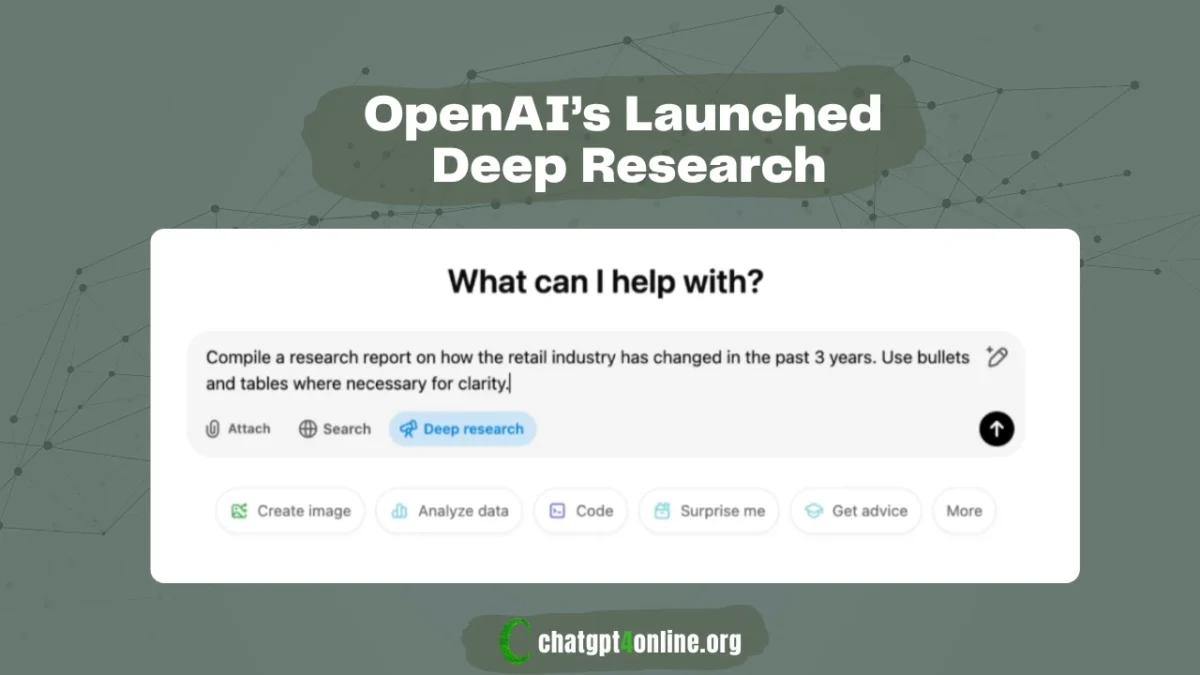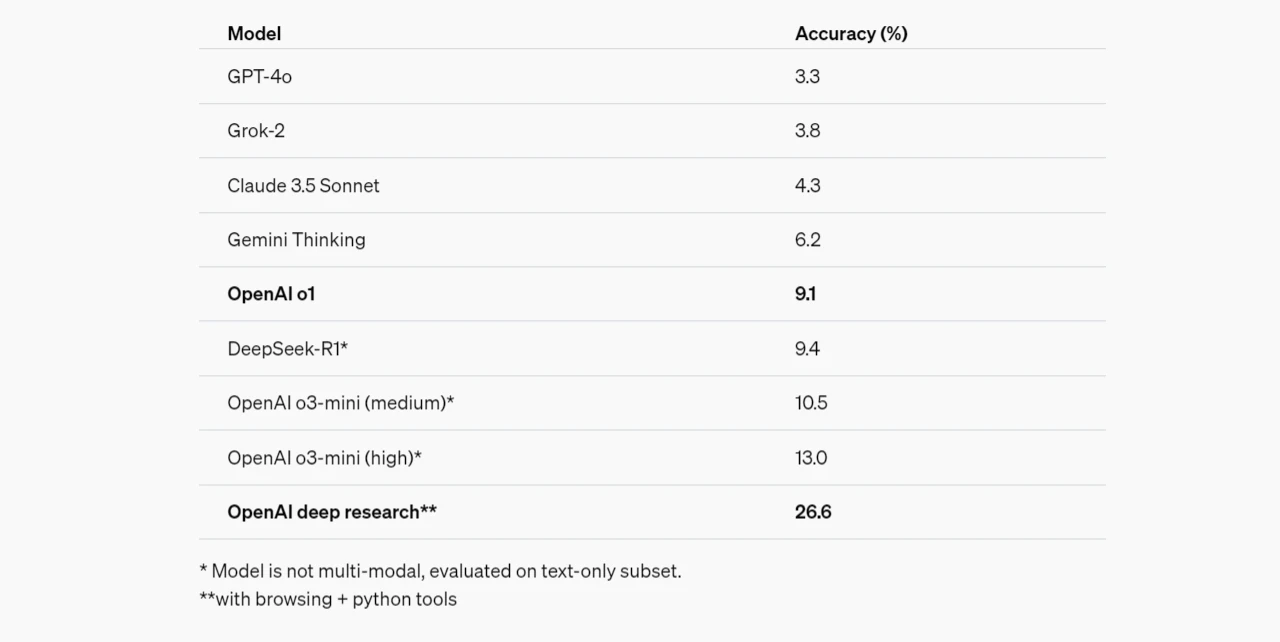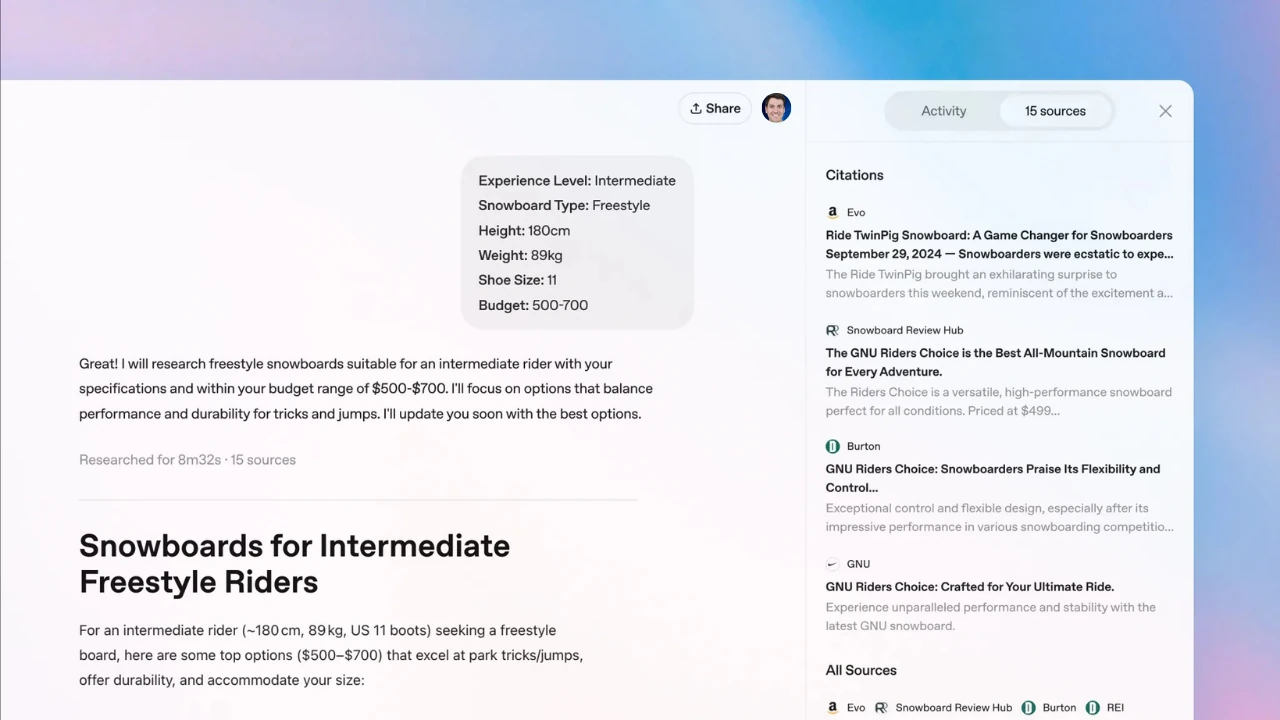OpenAI Launched A New ChatGPT Agent – Deep Research
OpenAI has once again pushed the boundaries of AI-driven research with the launch of Deep Research. It’s a powerful new AI agent designed to revolutionize the way AI gathers, analyzes, and synthesizes information. Earlier this year, the company announced its first autonomous computer-using agent.
Unlike traditional search engines or AI chat models that provide quick responses based on existing knowledge, Deep Research autonomously conducts multi-step research processes, sifting through vast amounts of data to deliver structured and well-cited insights.
It performs “tasks for much longer in an unsupervised way and this is core to our AGI roadmap,” said OpenAI.
The release of the Deep Search agent marks a significant shift in AI-assisted information retrieval, offering users a more comprehensive and reliable research companion.
Whether it’s uncovering obscure facts, analyzing business trends, or summarizing complex medical literature, Deep Research is built to handle sophisticated research tasks with precision.

As the demand for AI-driven analysis grows across industries, the latest ChatGPT free research agent redefines how professionals, businesses, and everyday users can engage with information.
How does Deep Research Differ from Web Search in ChatGPT?
While ChatGPT’s web search agent provides quick access to online information, Deep Research takes AI-driven information retrieval to a new level.
For casual queries and quick answers, ChatGPT’s web search is sufficient. However, for users needing deep, structured, and multi-source research, Deep Research offers a far more rigorous, methodical, and transparent approach. Here’s how it stands apart:
|
Web Search |
Deep Research |
|---|---|
|
It etrieves and summarizes information from search results in a single-pass response |
It Breaks down complex queries into multiple sub-questions, searches across different sources, and synthesizes findings into structured reports with citations. |
|
It provides a surface-level summary based on recent web sources. |
It performs in-depth analysis by retrieving data from diverse formats like PDFs, spreadsheets, and images, making it more suitable for academic, business, and specialized research tasks. |
|
It lists sources but may not provide structured citations or detailed cross-referencing. |
It cites sources systematically, ensuring transparency and traceability, reducing the risk of misinformation. |
|
It works well for general knowledge and trending topics but may struggle with highly technical or niche subjects. |
It excels at uncovering rare, obscure, or highly specialized knowledge, making it useful for fields like medical research, legal analysis, and market intelligence. |
|
It primarily relies on textual web pages for information retrieval. |
It processes multiple data types, including academic papers, research reports, and structured datasets, allowing for a more comprehensive understanding of a topic. |
|
It extracts key points but does not always perform multi-layered reasoning. |
It goes beyond keyword matching by connecting insights across multiple documents, ensuring well-reasoned, contextualized conclusions. |
How Deep Research Works?
Unlike traditional AI chat models that generate quick responses, Deep Research follows a methodical, expert-level process to deliver structured insights. It mimics how a human researcher would approach a complex question – but does so in a fraction of the time. Here’s how it works:
Multi-Step Research Process
Deep Research in ChatGPT doesn’t just fetch answers; it breaks down complex queries into multiple sub-tasks and tackles each systematically. Instead of relying on a single-pass search, it:
This approach ensures depth, accuracy, and contextual understanding beyond what traditional search methods offer.
Processing Time: Quality Over Speed
Unlike quick AI-generated responses, Deep Research takes 5 to 30 minutes to complete a request. This is because it follows a rigorous research methodology that would normally take a human expert hours or even days to accomplish.
For example, if tasked with reviewing multiple academic papers on a medical breakthrough, Deep Research will:
Expert-Level Analysis
Deep Research functions more like an AI-powered research analyst than a simple search chatbot. It:
This makes it highly valuable for users who require deep, accurate, and actionable insights rather than surface-level responses.
Handling Complex Data Formats
Unlike web search tools that primarily work with text-based web pages, Deep Research can analyze:
By processing these diverse formats, Deep Research delivers a richer and more reliable research experience compared to traditional AI search tools.
AI-powered research tools can hallucinate sometimes. However, Deep Research’s responses are“fully documented, with clear citations and a summary of [the] thinking, making it easy to reference and verify the information,” OpenAI said.
Want to use AI Research Assistant without signup/login? You can access web search with ChatGPT 4 Online.
How to Access Deep Research?
If you’re a ChatGPT Pro subscriber, you can access the ChatGPT Deep Research agent. You can enable Deep Research from the ChatGPT interface, similar to how browsing or code interpretation is toggled.
It works alongside other tools like web browsing but offers a deeper and more structured research experience.
As of now, it’s only available to OpenAI’s Pro plan, a $100 monthly subscription, users. OpenAI is expected to launch this research agent to ChatGPT plus, education, team, and enterprise users in the near future.
Performance and Benchmarking of the Agent
Deep Research is powered by the O3 reasoning model. OpenAI reported that it tested this ChatGPT’s agent using Humanity’s Last Exam, a rigorous evaluation comprising over 3,000 expert-level questions across multiple academic disciplines. The O3 model driving Deep Research achieved an accuracy of 26.6%.
Humanity’s Last Exam is designed to be significantly more challenging than standard benchmarks, with the goal of staying ahead of rapid advancements in AI. According to OpenAI, the Deep Research O3 model outperformed competitors such as Gemini Thinking (6.2%), Grok-2 (3.8%), and even OpenAI’s GPT-4o (3.3%) by a wide margin.

According to OpenAI, the research agent can browse over uploaded files and use a “Python tool for calculation and for images”. However, currently, it produces only textual outputs. It’s expected to produce visual outcomes soon.
Use Cases of ChatGPT Deep Research
This ChatGPT research agent is designed to assist users across various domains by offering precise, well-structured insights. Whether it’s for business decision-making, academic exploration, or personal curiosity, its capabilities span multiple industries and use cases. Here’s how Deep Research is set to make an impact:
1- Strategic Insights & Market Analysis
Companies can leverage Deep Research for competitive intelligence, financial forecasting, and trend analysis. By analyzing vast datasets, it helps businesses identify market opportunities, assess risks, and stay ahead of competitors.
Executives and analysts can rely on its structured reports to make informed decisions faster.
2- Finding Rare & Hidden Information
Locating obscure or deeply buried information can be challenging, but, according to OpenAI, Deep Research can uncover details that traditional search engines often miss.
It can extract relevant insights from large volumes of data for, for example, a niche scientific paper, an overlooked legal precedent, or even historical records of anything.
3- Advancing Healthcare Insights
In the medical field, accurate and up-to-date research is critical. Deep Research can scan and summarize medical journals, clinical trials, and healthcare data, making it an invaluable tool for doctors, researchers, and pharmaceutical companies.
It can help in literature reviews, drug research, and even discovering new treatment methodologies.
4- Understanding User Behavior / Improving UX Design
User experience (UX) designers and researchers can use Deep Research to analyze user feedback, industry reports, and case studies. By synthesizing large sets of qualitative and quantitative data, it helps teams make data-driven design improvements, leading to better products and user engagement.
5- Smarter Purchase Decisions
Deep Research can assist consumers in making well-informed shopping decisions by analyzing product specifications, customer reviews, and expert opinions.

Instead of relying on scattered online reviews, users can get structured comparisons, highlighting pros and cons based on real-world data.
6- Fact-Checking & Learning
For those who love to learn, Deep Research can deep dive into complex topics. Whether it’s for verifying historical events, understanding scientific phenomena, or exploring philosophical ideas, it provides well-cited, fact-based answers, making it a reliable source for personal and academic learning.
Final Thoughts
With the launch of Deep Research, OpenAI has introduced an AI tool that goes beyond simple web search or chatbot-generated answers. By mimicking the structured, multi-step approach of a human researcher, it delivers deep, well-cited, and expert-level insights – a capability that was previously time-consuming and labor-intensive.
From business intelligence to medical research, Deep Research stands out by handling complex queries, working across multiple data formats, and ensuring source transparency. Its ability to synthesize vast amounts of information in minutes makes it a game-changer for professionals, academics, and knowledge-driven users.
This AI agent by OpenAI is part of its roadmap to AGI and redefines how AI-assisted research is conducted, setting new benchmarks in accuracy, depth, and reliability.
Albert Haley
Albert Haley, the enthusiastic author and visionary behind ChatGPT 4 Online, is deeply fueled by his love for everything related to artificial intelligence (AI). Possessing a unique talent for simplifying complex AI concepts, he is devoted to helping readers of varying expertise levels, whether newcomers or seasoned professionals, in navigating the fascinating realm of AI. Albert ensures that readers consistently have access to the latest and most pertinent AI updates, tools, and valuable insights. Author Bio

